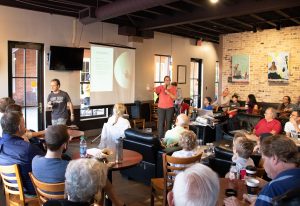Ole Miss physics professor Marco Cavaglia kicked off the seventh year of the Oxford Science Cafe on Tuesday night at Uptown Coffee on the Square.
The Science Cafe event hosts scientists and researchers from universities or research labs who give short, layman-level lectures on any topics within the scientific realm. This monthly event takes place at various coffee shops and eateries around Oxford.

UM visiting assistant professor of physics Jennifer Meyer lectures about the climate conditions of Saturn’s moon Enceladus during the Science Cafe event on Wednesday. Photo by Treviso Davis
“I think it is very important for people to hear about science — especially science that relates to what we do here at the University of Mississippi,” said Cavaglia, who has organized the event since its inception in 2011. “We encourage everyone to come — science nerds or not.”
Tuesday’s presentation was led by Jennifer Meyer, another physics professor at the university. Meyer discussed Enceladus, the sixth-largest of Saturn’s 53 confirmed moons, and its unique surface conditions.
“(Enceladus) has a surface temperature of (about) -200 degrees Celsius, so we were expecting it to be sort of a large, dusty snowball of a frozen planet,” Meyer said. “But we were surprised to discover that there is actually a huge geyser coming out of (its) south pole and a liquid ocean under (its) surface.”
The 2005 Cassini mission to Enceladus made these discoveries, and scientists have been researching this moon ever since. The most likely source of the energy that powers the geysers and keeps the subterranean ocean liquid is tidal heating. The presence of liquid water, among other factors, has made Enceladus one of NASA’s prime spots to look for life.
Meyer spoke highly of the concept of the Science Cafe event and said that it is definitely something the Oxford community can benefit from.
“It’s really nice that a mixture of students, faculty and community members come to this,” Meyer said. “It’s an opportunity to share what we (scientists) know with people in other academic areas and the community.”
Cavaglia sees the cafe as the perfect setting for those who might not typically be devoted to a specific field of science to learn something new about it.
“It’s not teaching,” Cavaglia said. “It’s communicating science to the general public in a way that (laymen) can understand it. Doing it in a cafe makes it so much more casual than a typical lecture.”

UM visiting assistant professor of physics Jennifer Meyer discusses the climate conditions of Saturn’s moon Enceladus on Wednesday during Science Cafe event. Photo by Treviso Davis
This event is not unique to Oxford, however. There are hundreds of Science Cafes all over the world.
“The way I heard about it was by being invited to speak about black holes at one in North Carolina,” said Cavaglia. “I said, ‘I think this could work in Oxford, as well, because anyone can be interested in science.’”
Cavaglia says that the event is popular among Ole Miss students and draws a crowd from the Oxford community, as well.
“Once, a member of the audience described the Oxford Science Cafe as a live ‘Nova’ show,” Cavaglia said. “What’s better than learning about the latest developments in science, face-to-face with scientists? You can’t ask questions to your TV set.”
The next Oxford Science Cafe will be on Oct. 16, though its topic and location have yet to be determined.






